[ad_1]
The founding of International PEN in London in 1921 by Mrs. A. Dawson Scott, a Cornish novelist, and John Galsworthy, a well-known literary figure who eventually became the first International PEN President was borne out of Dawson Scott’s belief that if the writers of the world could learn to stretch out their hands to each other, the nations of the world could learn in time to do the same. The idea came at the most appropriate time, when bitter hatred between nations following the First World War threatened world peace.
International P.E.N got further extended with the founding of the American Center in 1922. After having established a small circle of well-known writer- members and holding their first P.E.N. meeting in October 1921 in London, Galsworthy and Dawson Scott set about contacting American writers such as Kate Douglass Wiggin and Joseph Anthony to begin a center in New York. Both Anthony and Wiggin gathered their friends, and by March of 1922 they had formed the Organizing Committee. .
Although this Committee lacked a strong central figure like Galsworthy who could attract noteworthy writers through his personal friendship and influence, writers warmed up to the idea and joined and in a fairly short time the list of members had grown to include Frances Hodgson Burnett, Marc Connelly, Robert Frost, Ellen Glasgow, Eugene O’Neill, Edwin Arlington Robinson, and Elinor Wylie with membership representing all literary sets or styles. On Wednesday, April 19, 1922, a dinner held in the Coffee House Club with about forty people gathered marked the start of the American Center’s formal existence.
International PEN aims to promote intellectual co-operation and understanding among writers; thus creating a world community of writers, the only one of its kind, ever that emphasises the central role of literature in the development of world culture; and defending it against the many threats to its survival. The organisation has therefore been acting as a powerful voice in opposing political censorship and speaking for writers harassed, imprisoned, and sometimes murdered for the expression of their views.
In its early years International PEN had centres only in Europe. But in time writers of other nations joined enthusiastically so that by 1926 members from fifteen nations were able to meet in Berlin. Notable writers including from Britain Joseph Conrad, George Bernard Shaw and H.G. Wells and from across Europe Anatole France, Paul Valery, Thomas Mann, Croce and Karel Copek were always in its ranks .
The prospect of PEN in every capital city generated a wide appeal, and the writers of other nations joined enthusiastically: though not all the centres formed were to London’s taste. The French members were thought to be too young and too left wing, the Americans too exclusive.
It was one of Galsworthy’s ideas from the beginning that there should be an International Congress each year, to which all the Centers would send delegates. The first of these Congresses was held in London in 1923. By this time there was an impressive number of centers, and representatives came from Belgium, Czechoslovakia, Denmark, France, Italy, Norway, Romania, Spain, Sweden, and the United States.
The following year the American Center hosted an International Congress, in May 1924, consisting of three days of festivities and discussions, and the highlight was a gala banquet held at the Hotel Pennsylvania with a carefully planned menu of: international dishes honoring the delegates from their respective countries, such as Spain, Mexico, and Denmark.
In 1926, when the yearly international meeting assumed the dignity of a congress, writers from fifteen nations met in Berlin. Gradually the idea that a centre could represent a language and, or, a literature took root.: Basque and Catalan, Irish and Scottish centres appeared. Belgium was permitted two. Yugoslavia four
It was at the Congress in Brussels in June of 1927, that serious steps were taken to establish translation as a working entity of P.E.N. After many discussions and suggestions about promoting translation, Henry Seidel Canby formally presented a suggestion of setting up preferably in Paris, an international clearing house of literary information to simplify, clarify, speed and make more efficient to everyone concerned~author, publisher, and public~the flow of literary expression across language frontiers.
The Congress gave its hearty approval and set up a sub-committee consisting of Canby, Galsworthy, Mrs. Dawson Scott, and the International Secretary , Herman Ould. Confident of success, Canby talked with the directors of the League of International Cooperation in Geneva and was promised the use of part of the Palais Royal in Paris to be the headquarters for the translation bureau. Financial support came from various publishers, who would pay an annual fee for the use of the facilities of the clearing house. Eventually, support was coming from six London publishers, fourteen in Germany, and several in America. Although the American Center, in the spring of 1928, had managed to raise $6,500, it was a long way from the three thousand pounds that Galsworthy felt was necessary to make the project truly successful. Unfortunately, it was evident that P.E.N. was too new and loosely organized to make such an ambitious undertaking take off. Canby said, “The P.E.N. Club as a whole had not a sufficient central organization to guarantee the proper support and control.”
By 1931, at the Congress in Amsterdam, P.E.N. had grown to truly justify its identity as a worldwide organization. Delegates came not only from most of the European countries but from Australia, Canada, China, and South America.
In January of 1933, a year after the Budapest Congress, John Galsworthy died, leaving his Nobel Prize money in a trust fund for P.E.N. It was the last gift and contribution to an organization he loved and nurtured, watching it grow and take shape. His successor in the office of International President was H. G. Wells.
Today the PEN network consists of over 147 centres in over a hundred countries established in all four continents, including Africa where it is now concentrating its work. As a signal of this its 73rd International Congress was held in Dakar, Senegal. PEN Senegal which organized the 2007 congress is surrounded by a rich literary history dating back to 1956 when its writers started participating in promoting writing and writers internationally. So when the 1st Congress of Black Writers and Artists was held in Paris in 1956 an informal core of Senegalese writers had formed around the Presence Africaine journal under the auspices of the African Society for Culture. Then in 1959, Dr Ousmane Soce Diop and others led the creation of PEN CLUB SENEGAL
PEN work revolves around five principal committees:
The Writers in Prison committee works on behalf of persecuted writers worldwide monitoring cases of those who have been imprisoned, tortured, threatened, attacked and killed for the peaceful practice of their profession. It campaigns to end these attacks and opposes suppression of freedom of expression wherever it occurs.
The Translation and Linguistic Rights Committee has from 1978 been working to promote the world’s linguistic and cultural differences, the translation of contemporary literature and the promotion of the Universal Declaration of Linguistics Rights. Last year its multilingual E-Collection of poetry, fiction and essays expanded to include a total of 20 authors from 14 countries across the world.
The writers for Peace Committee founded in 1984 at the height of the Cold War is still dedicated to promoting the cause of peace and celebrates Writers for Peace Day each year on 3rd March. Its annual meeting in Bled last year featured papers and contributions discussing the themes of Globalisation of the World- Marginalisation of Literature-The Role of PEN in the Contemporary World, and Freedom of Expression as a Means Against Terrorism.
From 1991 the Women Writers Committee has been working to promote women’s writing and publishing and to encourage women to know, translate and popularize one another’s work
The Writers in Exile Network formed in 1999 establishes placement opportunities for exiled, immigrant and refugee writers at universities, colleges and learning centres around the world in collaboration with other organizations.
Nobel Prize for literature winners and other eminent writers from all over the world are usually enlisted amongst PEN members. These include Heinrich Boll, Arthur Miller, Mario Vargas Llosa, Per Wastberg and Gyorgy Konrad all of whom have served as Presidents. The Vice Presidency has been reserved traditionally as an honorary position for accomplished writers like J.M Coetzee, Nadine Gordimer, Toni Morrison, Margaret Atwood, Sook-Hee Chim, Alexandre Blokh and Joanne Leidom – Ackerman..
Related Article:
[http://www.sierraleonepen.org/]
[ad_2]
Source by Arthur Smith

















